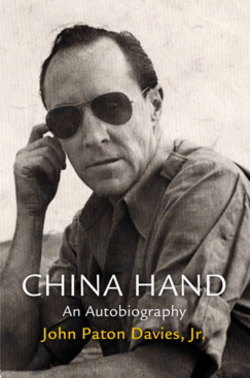China Hand

Реклама. ООО «ЛитРес», ИНН: 7719571260.
Оглавление
John Paton Davies Jr.. China Hand
CONTENTS
FOREWORD TODD S. PURDUM
CHAPTER I. THE FIRING
CHAPTER II. FROM CHINA TO AMERICA
CHAPTER III. MY ITINERANT EDUCATION
CHAPTER IV. HANKOW, THE FAR EAST DESK, AND PEARL HARBOR
CHAPTER V. TO ASIA WITH STILWELL
CHAPTER VI. A MOMENT WITH MR. GANDHI
CHAPTER VII. NEHRU AND “THE PROBLEM”
CHAPTER VIII. AN AMERICAN IN INDIA
CHAPTER IX. WILLKIE, WASHINGTON, AND VINEGAR JOE
CHAPTER X. AMONG THE NAGA HEADHUNTERS
CHAPTER XI. THE POLITICS OF WAR
CHAPTER XII. CAIRO: WITH ROOSEVELT, CHURCHILL, AND CHIANG
CHAPTER XIII. THE RESURRECTION OF BRITAIN’S EMPIRE. IN ASIA MAY BE SAID TO LIE OUTSIDE. THE SCOPE OF OUR MISSION
CHAPTER XIV. PATRICIA’S PASSAGE TO INDIA; A SOONG FAMILY FRACAS
CHAPTER XV. STILWELL’S WARS
CHAPTER XVI. THE GENERALISSIMO VERSUS THE GENERAL
CHAPTER XVII. MEETING MAO
CHAPTER XVIII. COMMUNISTS VERSUS NATIONALISTS. VERSUS HURLEY
CHAPTER XIX. POSTED TO MOSCOW
CHAPTER XX. HURLEY’S OPENING SALVO
CHAPTER XXI. POSTWAR MOSCOW
CHAPTER XXII. RETURNING TO AMERICA, AND THE CHINA LOBBY
CHAPTER XXIII. ASSIGNED TO KENNAN’S POLICY. PLANNING STAFF
CHAPTER XXIV. WORKING WITH THE NATIONAL. SECURITY COUNCIL
CHAPTER XXV. REVISITING ASIA IN 1948
CHAPTER XXVI “THE MOST NEFARIOUS CAMPAIGN OF. HALF-TRUTHS AND UNTRUTH IN THE. HISTORY OF THE REPUBLIC”
EPILOGUE BRUCE CUMINGS
INDEX
ACKNOWLEDGMENTS
Отрывок из книги
China Hand
I thought, then, as an undergraduate, that Davies’s story was a boy’s adventure come-to-life—especially if the boy in question happened to be a sensitive soul from a solid family, a straight-arrow good student, a keen observer of human nature, and a very good writer. I think all that, still (and Steven Spielberg and George Lucas would do well to take note of the tale that unfolds in the following pages). What I now also know—after a close reading of this elegant, if tantalizingly reticent and incomplete memoir—is that Davies was one of the indispensable Americans of the “Greatest Generation,” and his story is all the more compelling because he was largely (though not entirely) deprived of adequate public recognition in his long, rich lifetime.
.....
American journalists occasionally visited Manchuria. Frustrated in their efforts to get the truth from secretive Japanese officials, they called at the Consulate General for information. J. P. McEvoy of the Reader’s Digest was one. William Henry Chamberlin of the Christian Science Monitor and John Gunther were others. The Consul General, Joseph W. Ballantine, made a practice of briefing the visiting journalist orally. Then, if he judged the writer to be reputable and discreet, Ballantine would pile on a conference table a collection of our reports to Washington about Manchuria and invite the visitor to draw on their contents for the enlightenment of the American public. Ballantine cautioned the journalists not to reveal where they got this information and, if asked, to say that they found it in the gutter. John Gunther spent two days with our files; much of his Inside Asia section on Manchukuo was a rewrite of material he had gotten from us.
Most of the documents that Ballantine and I showed to journalists were classified. There were only two grades in those days: “Confidential” and, rather sweetly, “Strictly Confidential.” The latter was then regarded as “Eyes Only” in the subsequent runaway inflation of security. At any rate, we “violated security,” on our own initiative and for reasons that we considered to be in the national interest. We suffered no pangs of conscience over what we did. Quite to the contrary, we felt rather virtuous over making available, through journalists, classified information that we thought the American people had a right and need to know.
.....